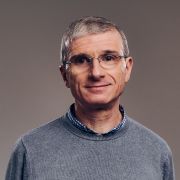Dr Joab Winkler
PhD
School of Computer Science
Reader
Course Director for MSc Artificial Intelligence
Member of the Machine Learning research group


+44 114 222 1834
Full contact details
School of Computer Science
Regent Court (CS)
211 Portobello
Sheffield
S1 4DP
- Profile
-
Joab Winkler is a Reader in The Department of Computer Science at The University of Sheffield. He obtained his undergraduate and PhD degrees at Imperial College London and University College London, respectively. He worked for a few years in industry, before returning to university to conduct research into algebraic and numerical properties of curves and surfaces in computer-aided design systems. He has extended this interest in numerical methods to work on blind image deconvolution, optical flow and neural networks. More details are in the section 'Research interests'.
- Research interests
-
Joab Winkler’s main research interest is the algebraic and numerical properties of curves and surfaces in computer-aided design systems. Most of this work has been performed using resultant matrices, and this has led him to consider more general issues of robust computations on polynomials that are corrupted by added noise. Examples include the computation of a structured low rank approximation of the Sylvester resultant matrix, the deconvolution of two polynomials and the determination of an approximate greatest common divisor of two polynomials.
He has developed a polynomial root solver for the determination of multiple roots of the theoretically exact form of a polynomial, when the coefficients of the given polynomial are corrupted by added noise. He has applied the methods used in this work on polynomials to the deblurring of an image when the point spread function is unknown and must therefore be computed. This is a difficult problem because it is necessary to determine the rank of a matrix whose entries are subject to error. This is one of the most difficult problems in linear algebra.
He has also considered numerical and computational issues in optical flow, which is an important problem in computer vision, in order to identify problems that arise in two commonly used algorithms.
More recently, he has started work on numerical properties of echo state networks, which are one form of a neural network.
- Publications
-
Books
- Lecture Notes in Computer Science (Including Subseries Lecture Notes in Artificial Intelligence and Lecture Notes in Bioinformatics): Preface.


Journal articles
- Overfitting, regularisation and condition estimation in regression. International Journal of Data Science and Analytics, 22(13).


- Analysis and implications of a negative parameter in Tikhonov regularisation. Communications in Statistics - Theory and Methods. View this article in WRRO


- Numerical properties of solutions of LASSO regression. Applied Numerical Mathematics, 208(Part A), 297-309. View this article in WRRO


- Error analysis and condition estimation of the pyramidal form of the Lucas-Kanade method in optical flow. Electronics, 13(5). View this article in WRRO


- The application of regularisation to variable selection in statistical modelling. Journal of Computational and Applied Mathematics, 404. View this article in WRRO


- The computation of the greatest common divisor of three bivariate Bernstein polynomials defined in a rectangular domain. Applied Numerical Mathematics, 166, 348-368. View this article in WRRO


- An approximate factorisation of three bivariate Bernstein basis polynomials defined in a triangular domain. Journal of Computational and Applied Mathematics, 390.


- The computation of the degree of the greatest common divisor of three Bernstein basis polynomials. Journal of Computational and Applied Mathematics, 373.


- Condition estimation for regression and feature selection. Journal of Computational and Applied Mathematics, 373. View this article in WRRO


- The computation of multiple roots of a Bernstein basis polynomial. SIAM Journal on Scientific Computing, 42(1), A452-A476. View this article in WRRO


- The Sylvester and Bézout Resultant Matrices for Blind Image Deconvolution. Journal of Mathematical Imaging and Vision, 60(8), 1284-1305.


- A non-linear structure-preserving matrix method for the computation of the coefficients of an approximate greatest common divisor of two Bernstein polynomials. Journal of Computational and Applied Mathematics, 320, 221-241. View this article in WRRO


- The computation of the degree of an apprixmate greatest common divisor of two Bernstein polynomials. Applied Numerical Mathematics, 111, 17-35.


- Structured matrix methods for the computation of multiple roots of a polynomial. Journal of Computational and Applied Mathematics, 272, 449-467. View this article in WRRO


- A structure-preserving matrix method for the deconvolution of two Bernstein basis polynomials. Computer Aided Geometric Design.


- Resultant matrices and the computation of the degree of an approximate greatest common divisor of two inexact Bernstein basis polynomials. Computer Aided Geometric Design, 30(4), 410-429.


- An improved non-linear method for the computation of a structured low rank approximation of the Sylvester resultant matrix. Journal of Computational and Applied Mathematics, 237(1), 253-268.


- The computation of multiple roots of a polynomial. Journal of Computational and Applied Mathematics.


- Two methods for the calculation of the degree of an approximate greatest common divisor of two inexact polynomials. Calcolo, 49(4), 241-267.


- The calculation of the degree of an approximate greatest common divisor of two polynomials. J COMPUT APPL MATH, 235(6), 1587-1603.


- A non-linear structure preserving matrix method for the low rank approximation of the Sylvester resultant matrix. J COMPUT APPL MATH, 234(12), 3226-3242.


- A unified approach to resultant matrices for Bernstein basis polynomials. COMPUT AIDED GEOM D, 25(7), 529-541.


- Structured total least norm and approximate GCDs of inexact polynomials. J COMPUT APPL MATH, 215(1), 1-13.


- STRUCTURED LOW RANK APPROXIMATIONS OF THE SYLVESTER RESULTANT MATRIX FOR APPROXIMATE GCDS OF BERNSTEIN BASIS POLYNOMIALS. ELECTRON T NUMER ANA, 31, 141-155.


- High order terms for condition estimation of univariate polynomials. SIAM J SCI COMPUT, 28(4), 1420-1436.


- The numerical condition of univariate and bivariate degree elevated Bernstein polynomials. J COMPUT APPL MATH, 191(1), 32-49.


- Backward errors and condition numbers of regular and singular points on algebraic curves. Lecture Notes in Computer Science Including Subseries Lecture Notes in Artificial Intelligence and Lecture Notes in Bioinformatics, 3604 LNCS, 413-433.


- Structured matrix methods for CAGD: An application to computing the resultant of polynomials in the Bernstein basis. NUMERICAL LINEAR ALGEBRA WITH APPLICATIONS, 12(8), 685-698.


- The transformation of the companion matrix resultant between the power and Bernstein polynomial bases. APPL NUMER MATH, 48(1), 113-126.


- A companion matrix resultant for Bernstein polynomials. Linear Algebra and Its Applications, 362, 153-175.


- A statistical analysis of the numerical condition of multiple roots of polynomials. COMPUT MATH APPL, 45(1-3), 9-24.


- Case study of a wave event in the stable atmospheric boundary layer overlying an Antarctic Ice Shelf using the orthogonal wavelet transform. DYNAMICS OF ATMOSPHERES AND OCEANS, 34(2-4), 245-261.


- Condition numbers of a nearly singular simple root of a polynomial. APPL NUMER MATH, 38(3), 275-285.


- A note on the backward error of the roots of polynomials.. Neural Parallel Sci. Comput., 9, 91-96.


- A comparison of the average case numerical condition of the power and bernstein polynomial bases. International Journal of Computer Mathematics, 77(4), 583-602.


- A resultant matrix for scaled Bernstein polynomials. LINEAR ALGEBRA APPL, 319(1-3), 179-191.


- Backward error analysis of the roots of polynomials. Neural, Parallel and Scientific Computations, 7, 463-486.


- An ill-conditioned problem in computer aided geometric design. Neural, Parallel & Scientific Computations, 5(1-2), 179-200.


- Polynomial basis conversion made stable by truncated singular value decomposition. APPL MATH MODEL, 21(9), 557-568.


- Tikhonov regularisation in standard form for polynomial basis conversion. APPL MATH MODEL, 21(10), 651-662.


- Singular projective transformation matrices. APPL MATH MODEL, 20(10), 771-778.


- ACCURATE FIELD ANALYSIS OF THE PROPAGATION OF ELASTIC-WAVES THROUGH AN ACOUSTIC MICROSCOPE .1. THEORY. IEEE T ULTRASON FERR, 33(6), 644-656.


- ACCURATE FIELD ANALYSIS OF THE PROPAGATION OF ELASTIC-WAVES THROUGH AN ACOUSTIC MICROSCOPE .2. RESULTS. IEEE T ULTRASON FERR, 33(6), 657-668.


- ELIMINATION OF SPURIOUS MODES IN FINITE-ELEMENT ANALYSIS. J COMPUT PHYS, 56(1), 1-14.


- Regularisation and the least squares problem in the analysis of echo state networks. Physica Scripta.


- Polynomial computations for blind image deconvolution. Linear Algebra and its Applications .


Conference proceedings
- Blind image deconvolution using the Sylvester resultant matrix. 2015 IEEE International Conference on Image Processing (ICIP) (pp 784-788). Quebec City, Canada, 27 September 2015 - 27 September 2015. View this article in WRRO


- Blind image deconvolution using the Sylvester resultant matrix. 2015 IEEE International Conference on Image Processing (ICIP) (pp 784-788), 27 September 2015 - 30 September 2015.


- The Sylvester Resultant Matrix and Image Deblurring. 8th International Conference on Curves and Surfaces (pp 461-490). Switzerland, 12 June 2014 - 18 June 2014.


- The Sylvester Resultant Matrix and Image Deblurring (pp 461-490)


- Mathematics of Surfaces XII. Springer (LNCS 4647), Vol. 4647. Sheffield, 4 September 2007 - 7 September 2007.


- Condition numbers and least squares regression. Mathematics of Surfaces XII, Proceedings, Vol. 4647 (pp 480-493)


- Structure Preserving methods for the computation of approximate GCDs of Berstein polynomials. 6th International Conference on Curves and Surfaces (pp 11-20). Avignon, France, 29 June 2006 - 5 July 2006.


- Automatic face recognition using stereo images. 2006 IEEE INTERNATIONAL CONFERENCE ON ACOUSTICS, SPEECH AND SIGNAL PROCESSING, VOLS 1-13 (pp 5771-5774)


- A comparison of condition numbers for the full rank least squares problem. DETERMINISTIC AND STATISTICAL METHODS IN MACHINE LEARNING, Vol. 3635 (pp 296-318)


- Deterministic and Statistical Methods in Machine Learning, First International Workshop, Sheffield, UK, September 7-10, 2004, Revised Lectures. Deterministic and Statistical Methods in Machine Learning, Vol. 3635


- Numerical and algebraic properties of Bernstein basis resultant matrices. COMPUTATIONAL METHODS FOR ALGEBRAIC SPLINE SURFACES (pp 107-118)


- The Sylvester resultant matrix for Bernstein polynomials. Curve and Surface Fitting: Saint-Malo 2002 (pp 407-416). Saint-Malo, 2002 - 2002.


- Uncertainty in Geometric Computations. Uncertainty in Geometric Computations. Sheffield, 5 July 2001 - 6 July 2001.


- Properties of the companion matrix resultant for Bernstein polynomials. UNCERTAINTY IN GEOMETRIC COMPUTATIONS, Vol. 704 (pp 185-198)


- Computational experiments with resultants for scaled Bernstein polynomials. MATHEMATICAL METHODS FOR CURVES AND SURFACES: OSLO 2000 (pp 535-544)


- A class of Bernstein polynomials that satisfy Descartes' rule of signs exactly. MATHEMATICS OF SURFACES IX (pp 424-437)


- The numerical condition of roots of polynomials in Bernstein form. Proceedings of the 8th IMA Conference on The Mathematics of Surfaces (pp 265-280). Birmingham, 31 August 1998 - 2 September 1998.


- Numerically stable conversion between the Bezier and B-spline forms of a curve. Curves and Surfaces with Applications in CAGD (pp 465-472). Chamonix, 30 June 1997.


- The sensitivity of linear algebraic equations. 5th SIAM Conference on Applied Linear Algebra. Snowbird, Utah, USA, 15 June 1994 - 18 June 1994.


- Lecture Notes in Computer Science (Including Subseries Lecture Notes in Artificial Intelligence and Lecture Notes in Bioinformatics): Preface.
- Grants
-
- Sparse linear models: Their existence and stability, EPSRC, 09/2022 - 07/2023, £79,384, as PI
- Travel Grant, EPSRC, 07/2001 to 08/2001, £1,430, as PI
- Tensor Tomography for the Three Dimensional Photoelasticity, EPSRC, 11/2002 to 04/2006, £38,818, as PI
- Robust Computations in Geometric Modelling, EPSRC, 02/2005 to 01/2008, £71,785, as PI
- Travel Grant, EPSRC, 10/2005 to 01/2006, £4,100, as PI
- Polynomials and geometric modelling, ROYAL ACADEMY OF ENGINEERING (THE), 01/2010 to 12/2012, £23,613, as PI
- Professional activities and memberships
-
- Awarded an EPSRC Advanced Research Fellowship (1995)
- Co-organiser of a workshop, supported by the EPSRC, on The Representation and Management of Uncertainty in Geometric Computations (2001)
- Co-organiser of The Sheffield Machine Learning Workshop, supported by the EPSRC (2004)
- Organised the Summer School, supported by the EPSRC, Solving Polynomial Equations and Structured Matrix Methods for Approximate GCD Computations (2007)
- Awarded a Global Research Award by The Royal Academy of Engineering (2010-2011)
- Co-organiser of a conference in Kalamata, Greece on structured methods in numerical linear and multilinear algebra (2014)
